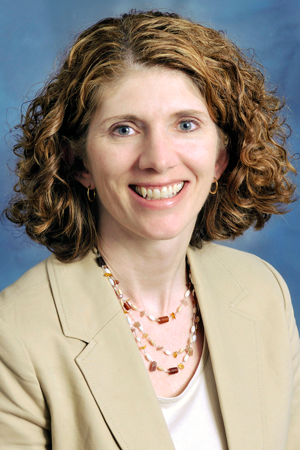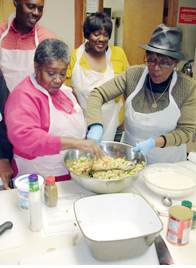No more fried chicken at one church: ‘Faith, Activity and Nutrition’ study has congregations making changes

Dr. Sara Wilcox
February 5, 2013
Old habits die hard, especially when they’re part of a Sunday tradition. But some African-American churchgoers in South Carolina are finding that change can be a good thing when it comes to eating better and staying active.
As part of a project led by USC’s Arnold School of Public Health, 74 African Methodist Episcopal (AME) churches participated in a program to help members lead healthier lifestyles through increased physical activity and healthier food choices. Researchers worked in partnership with AME church leaders and members to design and implement the Faith, Activity and Nutrition (FAN) program and trained church leaders to incorporate it into their congregations.
The five-year project was funded with a $3.3 million grant from the National Institutes of Health and also included researchers from the Medical University of South Carolina, Clemson University and Allen University. It found that members from trained churches were more likely to engage in physical activity and eat more fruits and vegetables than members from churches that did not undergo the training. Approximately 1,250 members participated in the study and more than half had two or more chronic diseases. The findings of the study are published in the American Journal of Preventive Medicine.
“We were very encouraged by the findings,” said lead researcher Dr. Sara Wilcox of USC’s Arnold School. “If you think about scaling this up to churches across the state, even very small changes can translate to significant and meaningful public health effects.”
South Carolina consistently ranks near the bottom nationwide in overall health (46th), and African- Americans are even more likely to develop--and die--from chronic health conditions like diabetes and high blood pressure than whites. The FAN program worked with AME churches in six South Carolina counties with high health disparities (Berkeley, Charleston, Florence, Georgetown, Richland and Williamsburg).

An important part of FAN included
the training of cooks who were
involved in church nutrition
programs and meals
“Churches are natural partners to help eliminate health disparities in the African-American community,” Wilcox said. “For many, especially in the South, the church is the center of their life and is a trusted institution.”
Unlike other studies, the FAN program worked with church leaders to help make changes to the church environment. For example, church leaders learned how to build physical activity into regular church activities. They also helped church cooks modify recipes to make traditional foods healthier, such as baked chicken instead of fried, and encouraged them to switch to more fresh fruits, vegetables and whole grains. Meals and snacks also were prepared with less sodium and fewer grams of fat.
The Rev. Kenneth Taylor of the Turner Memorial AME Church in West Columbia, which participated in the FAN program, said many in his congregation are reluctant to participate in traditional exercise classes. Instead, the pastor gets church members moving in the pews to specially selected gospel tracks as part of the church service. And chicken served at church functions is baked or grilled, but not fried.
“Some of our people who would otherwise not be physically active are more willing to do it when it’s a way of praising God,” said Taylor, adding that Turner Memorial AME also started a garden where members get exercise planting and harvesting vegetables used in church meals.
“The (FAN) program is wonderful because it takes a holistic approach and allows us to improve lives through praise and worship.”
Visit http://www.scivee.tv/node/56520 to view a video about the FAN program.



_01.jpg)
_02.jpg)